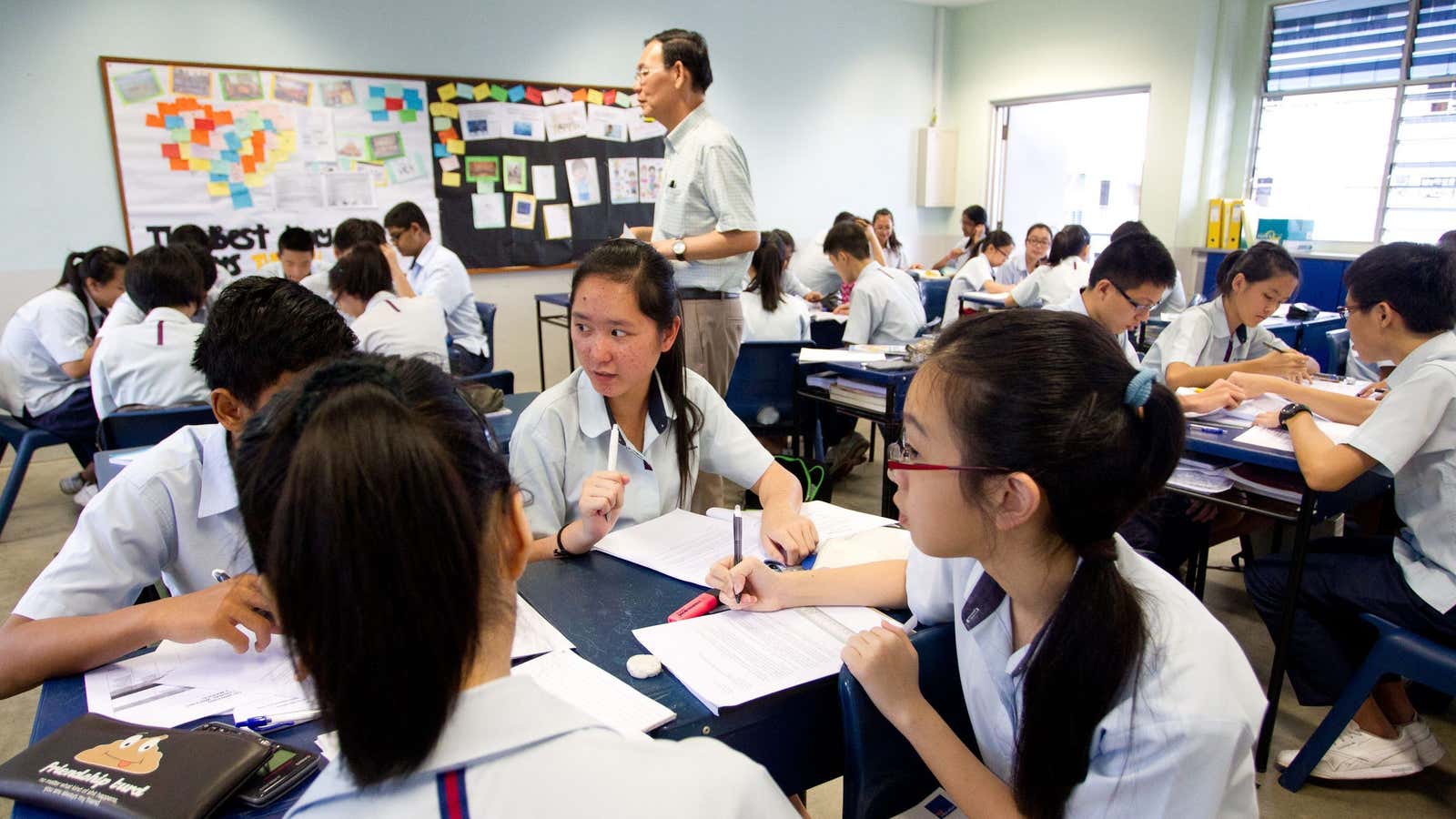Singapore keeps getting better at English.
The city-state made the top three of an annual ranking in English proficiency conducted by English education company EF Education First (EF), the highest-ever ranking for an Asian nation. Though Singapore has for years ranked near the top of the list, this year, it leapfrogged Norway and Denmark to place behind Sweden and the Netherlands.
Minh Tran, the Hong Kong-based co-author of the report who frequently consults on English education for foreign companies and governments, attributes Singapore’s success in large part to the single-minded focus of the country’s late founder, Lee Kuan Yew, on making English the medium of instruction. The other three official languages of Singapore—Mandarin, Malay, and Tamil—are taught as secondary languages. Singapore’s teachers, Tran added, are also highly trained (paywall) and well paid, with generous funding provided for continuous training both at home and overseas for teachers.
The data, however, come with a few caveats. The proficiency scores are based on free online tests, so the people taking them are self-selected and are not a representative sample of the country’s citizens.
Singapore’s success, Tran noted, comes in stark contrast to another territory that’s oft compared to the city-state, Hong Kong, also a former British colony with a relatively small population. In Hong Kong, which placed 30th in this year’s survey, English is not uniformly adopted as the language of instruction in schools, with most opting to teach in Cantonese, the city’s lingua franca, or in Mandarin. After dropping in the rankings between 2013 and 2015, the city’s English proficiency has stagnated since, said Tran—partly a reflection of the difficult social and political debate taking place over Hong Kong’s identity and relationship with mainland China.
The results also highlight the shortcomings in other Asian countries that have long tried to raise their English proficiency. That’s in part a reflection of larger population sizes in countries like Japan and South Korea, which make adopting English in daily use more difficult. But Tran said that cultural reasons also play an important part. In Korea, an excessive focus on testing and the ultra-high-pressure environment takes the fun out of learning English entirely, while in Japan, a culture where “you really can’t make a mistake” makes it difficult to learn a new language. (“You have to sound like a fool in order to learn a language,” he said.) At 49th, Japan is considered a country with “low proficiency” in English, while Korea fared better at 31st as a country with “moderate proficiency.”
Japan is making a renewed push to boost English proficiency as Tokyo prepares to host the Olympics in 2020 and as the country welcomes an unprecedented number of foreign tourists. Another place that is shifting its focus to English is Taiwan, which laid out plans in August to make English an official language next year. That decision comes amid a broader debate over its identity, which like Hong Kong is also shaped by its relationship with China. It’s also important for Taiwan, which ranks 48th, to improve its English as a trade-focused economy, said Tran.
But Singapore’s near obsessive focus on English proficiency has also come at a cost. The government’s Speak Good English campaign, launched in 2000, has been criticized as an attempt to suppress the country’s own form of English—Singlish—and marginalizing the array of Chinese dialects spoken by older Singaporeans. As a result, there’s been revived interest in learning these dialects (paywall) in recent years, and even a growing movement to take pride in Singlish rather than see it as a lower class, unrefined version of English. One secondary school student, for example, recently wrote in a letter to Singapore’s national daily to say, “I believe Singlish is part of our Singaporean culture, and gives us a sense of belonging. Hence, it should not be considered lowly to speak Singlish.”
It’s a challenge other small countries are also facing, such as Iceland, where English is usurping the native tongue in all aspects of life. Tran said that as the world moves to be more multilingual, “it’s not good enough to just have your native language, and not just English. The country that wins… is the country that balances that best.”
